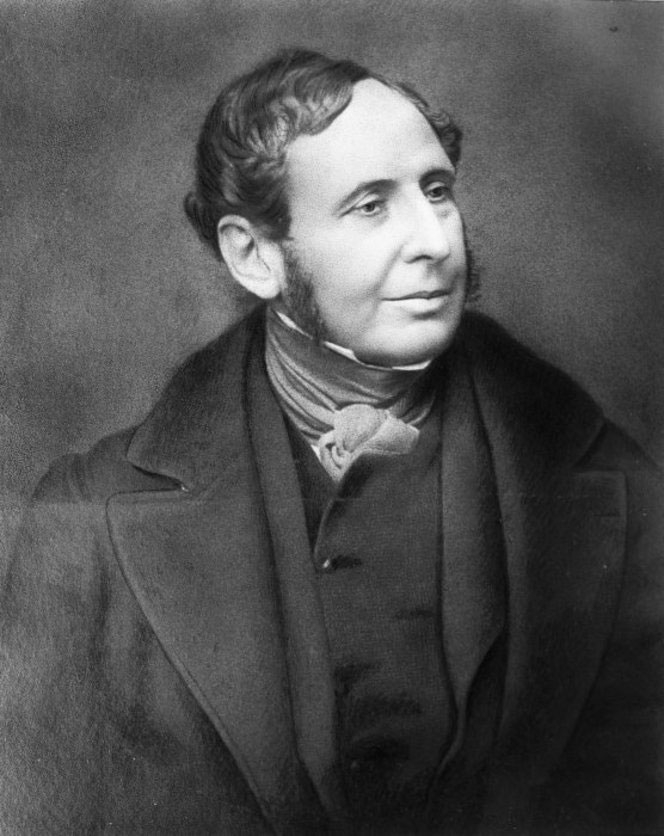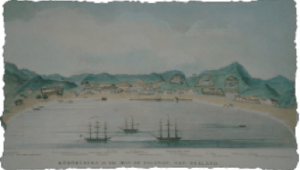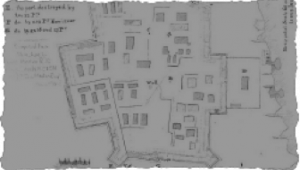
Robert Fitzroy



Fitzroy was basically a decent man assigned a task made impossible due to a lack of support from the Colonial Office. He had a great many problems to deal with all at once, and he did make some genuine attempts to establish a lasting peace in the Bay of Islands. After his recall back to England he became a convenient scapegoat, blamed for a great many of problems, which were not really his fault.

Governor: principled, dutiful, underappreciated
Born 5 July 1805
Died 30 April 1865
Spouse (1) Mary Henrietta O’Brien (died young) (2) Maria Isabella Smyth
Children Three daughters and one son with his first wife, one daughter with his second wife
Early Years
Fitzroy was born into the upper echelons of society, the grandson of the Duke of Grafton and the Marquis of Londonderry. Although born into privilege, he was not in line to inherit any titles or great wealth. Like many aristocratic young men in his position, he chose military service, becoming a lieutenant in the Royal Navy at about 20 years of age. During his time at naval college, he excelled in the study of mathematics, classics, history, geography, navigation, and many other fields.
By 1828, he was captain of his own ship – and not just any ship. Fitzroy was captain of the Beagle during Charles Dawin’s famous voyage of discovery. The two men became friends, and Fitzroy established a reputation as a scientist, navigator, and surveyor. Upon his return, he published an account of the voyage in four volumes. A deeply religious man, he had some difficulties reconciling his scientific observations with his Christian beliefs, especially in his later years.
Governor of New Zealand
Fitzroy began his term as Governor of New Zealand in December 1843. Everybody had high expectations of him – Māori, the settlers, and his superiors in England. However, it was almost impossible for him to live up to expectations. He was instructed to maintain order and to protect the rights of Māori and at the same time to satisfy the land-hungry settlers flooding into the colony. Even if he had sufficient resources – which he certainly did not – it would have been an extremely difficult task. New Zealand was bankrupt, funding from the British Government was not forthcoming and sufficient military support was not available.
One of the first issues he had to deal with was the aftermath of the Wairau affray, when the warrior chief Te Rauparaha killed 20 settlers near Nelson. Fitzroy examined the facts and determined that the settlers had acted unlawfully. His decision not to act against Te Rauparaha was a sensible one, especially given the absence of proper military support, but he earned the enduring enmity of the settlers. Several times during his tenure Fitzroy refused to send soldiers to evict Māori land claimants, which did not improve his relations with the pākehā settlers.
Meanwhile trouble was brewing in the North. Hone Heke chopped down the flagstaff for the first time in July. Heke was trying to force the Governor to communicate with him and pay attention to his grievances. Fitzroy didn’t really comprehend Hene’s intentions, and he insulted the Ngāpuhi chiefs by re-erecting the flagstaff before responding to their communications. He sent to New South Wales for military support, and decided to send a contingent of soldiers to the North to protect the flagstaff. The chiefs were determined to keep the soldiers out of the North, and stepped up their diplomatic efforts.
To his credit, Fitzroy was prepared to listen to advice from the missionaries and several of the Ngāpuhi chiefs. He arrived in the North in August and attended the second of two very important meetings held at the Waimate Mission Station. He came unarmed, without soldiers, and with a genuine desire to negotiate peace.1 An agreement was reached: certain Ngāpuhi chiefs promised to maintain the peace and to keep Heke under control and in return Fitzroy agreed to keep the soldiers out of Northland.
Fitzroy had a great many problems to deal with during the build-up to the Northern War. A lot of them were financial: the Colony was desperately short of money, and Fitzroy was forced to take drastic action. Against instructions, he issued government debentures and went on to declare them legal tender. No doubt under a great deal of stress, Fitzroy refused Heke’s invitation to travel north for a meeting in late 1844. In early 1845, when Heke again attacked the flagstaff, Fitzroy responded by sending soldiers to the North.
It was not his handling of the Northern War that led to Fitzroy’s dismissal as Governor of New Zealand. His dismissal was announced in the House of Commons in May 1845, less than two months after the war began. It was his handling of financial issues that got him off-side with his superiors. This was quite unfair. Fitzroy faced huge problems that the Colonial Office failed grasp. Disobeying orders was a last resort, but the British authorities could not countenance such behaviour. In November 1846, George Grey took over as Governor in, with twice the salary and three times the budget.
Back in Great Britain, Fitzroy became something of a scapegoat for the failure of Colonial Office policy in New Zealand.2 The history books have treated him unkindly, in part due to the calculating nature of his successor:
“When Sir George Grey became Governor of New Zealand he deliberately wrote down the results of the work of his predecessor … people though a remarkable improvement had been made in a short period. … However, Sir George Grey was unable to destroy all the records. The records that have been kept of that period show that Governor Fitzroy was not the rogue which his successor made him out to be, and Sir George Grey was not the brilliant man he made himself out to be.”3
Later Years
In 1850, Fitzroy retired from active military service. His achievements in science were recognised when he was elected a fellow of the highly distinguished Royal Society of London. A few years later, he was employed as a meteorologist, in charge of Great Britain’s first weather office. He made impressive achievements in the field of weather forecasting, but he was stressed and overworked. To make matters worse, his money was gone and his debts were mounting. A man dedicated to his work, Fitzroy had exhausted much of his personal fortune on public expenditure.
The eventful life of Robert Fitzroy ended in tragic circumstances. Suffering from severe depression Fitzroy committed suicide on 30 April 1865. He left behind his wife Maria and five children.



